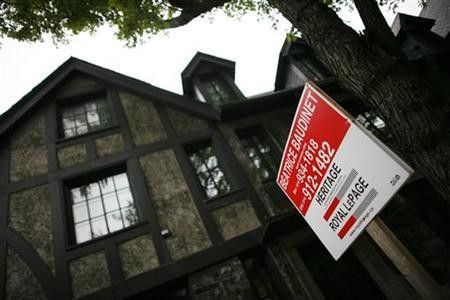Factory, housing data flash warning signal

Canadian manufacturing sales slid more than expected in June, while sales of existing homes were flat in July, data on Tuesday showed, offering new signals that the Canadian economy is slowing.
Also, the Conference Board of Canada released a survey showing weaker corporate profits in the second half of the year.
Factory sales dropped a much greater-than-expected 1.5 percent in June from May, Statistics Canada said, all but confirming that the economy stalled in the second quarter. Analysts had expected a milder 0.4 percent decline.
It was the third consecutive monthly fall in manufacturing sales, which in June were at the lowest level since November 2010. A 1.6 percent increase in new orders and a 3.4 percent jump in unfilled orders provided some consolation in an otherwise disappointing report.
"Going forward, the overall weak profile for economic growth among Canada's key trading partners over the next few months is likely to weigh heavily on the manufacturing sector," said Francis Fong, an economist at Toronto-Dominion Bank.
"Sales will likely continue to struggle despite the thawing in global supply chains following March's Japanese earthquake and the (Canadian) dollar having pulled back by almost 5 cents from just a few weeks ago."
The Canadian dollar was at C$0.9819 to the U.S. dollar, or $1.0184, on Tuesday afternoon, down from a recent high of C$0.9407 to the U.S. dollar, or $1.0630 three weeks ago. A strong Canadian dollar makes Canadian-made goods more expensive in foreign markets.
The supply-chain problems, as well as the dampening effect of rising inflation on consumer spending, have added to the weaker outlook for profits, the Conference Board said.
Its leading indicator of industry profitability, which tracks 49 Canadian industries, contracted for the first time in almost a year, down 0.1 percent, after flat readings the previous two months.
Softer economic data of late have also reduced the already minute prospect that the Bank of Canada will raise interest rates this year. Canada's big banks now forecast that there will be no rate hikes until next year.
As recently as late July, the central bank had predicted second quarter growth of 1.5 percent on an annualized basis.
That forecast now looks hopelessly optimistic, given a recent string of weak data that shows the economy is struggling to deal with a still-strong Canadian dollar and weak U.S. demand.
In a sign of increasing political concern over the economy and recent turmoil on financial markets, the House of Commons finance committee has asked Finance Minister Jim Flaherty and Bank of Canada Governor Mark Carney to testify to legislators this Friday.
HOUSING FLAT IN JULY
Sales of existing homes in Canada in July were little changed from June as activity cooled a bit in the hot markets of Toronto and Vancouver, the Canadian Real Estate Association (CREA) said.
CREA said 37,492 homes changed hands in July, down 0.1 percent from June, but up 12.3 percent from the same month last year. That reflected a drop in activity in July 2010, when resales for the month hit their lowest point since 2002.
The national average price in July rose 9.3 percent from a year earlier to C$361,181 ($368,552), CREA said.
Unlike the United States and other developed countries, Canada's housing sector has been a steady source of support for the economy, helping draw it out of the recession.
But its impact has been ebbing as pent-up demand has been absorbed and tougher mortgage rules were implemented earlier in the year. Low and steady interest rates in the short term could keep activity supported, but are not likely to induce a frenzy.
"Overall the picture that is emerging is of a relaxed market," said Benjamin Tal, economist at CIBC World Markets.
"The realization that the Bank of Canada will not be raising interest rates in the coming months is working to remove any sense of urgency to front-load activity. At this point we do not see any catalyst that will change the current trend in any dramatic way."
CREA said it now sees 450,800 sales this year, up less than 1 percent from 2010. Previously CREA had expected a decline of about 1 percent this year. It also forecast the average price to rise 7.2 percent in 2011 to C$363,500, compared to its forecast in May of a 4-percent rise this year to C$352,500.
© Copyright Thomson Reuters {{Year}}. All rights reserved.





















